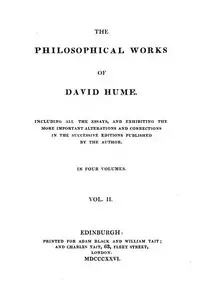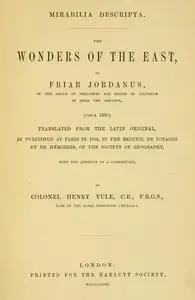"Philosophical Works, v. 2 (of 4)" by David Hume is a philosophical treatise written in the early 19th century. This volume primarily explores the nature of human emotions, specifically the passions of pride and humility, and their underlying psychological mechanisms. It aims to systematically analyze how these emotions arise, their causes and effects, and how they relate to self-perception and social interactions. The opening of this volume sets the stage for a thorough examination of pride and humility. Hume begins by distinguishing between original and reflective impressions within the realm of human perception and emotions. He discusses how these two passions are directly opposed but share the same object—self. Hume emphasizes that pride arises from favorable perceptions of oneself, while humility stems from unfavorable views. He also notes that the causes of these passions are varied, extending beyond just personal attributes to include external possessions and social status. Throughout this exploration, Hume emphasizes the importance of both the qualities producing pleasure or pain and their relationship to the self, laying a foundation for understanding the complexities of human emotions. (This is an automatically generated summary.)

Philosophical Works, v. 2 (of 4) Including All the Essays, and Exhibiting the More Important Alterations and Corrections in the Successive Editions Published by the Author
By David Hume
"Philosophical Works, v. 2 (of 4)" by David Hume is a philosophical treatise written in the early 19th century. This volume primarily explores the nat...
David Hume was a Scottish philosopher, historian, economist, and essayist who was best known for his highly influential system of empiricism, philosophical scepticism and metaphysical naturalism. Beginning with A Treatise of Human Nature (1739–40), Hume strove to create a naturalistic science of man that examined the psychological basis of human nature. Hume followed John Locke in rejecting the existence of innate ideas, concluding that all human knowledge derives solely from experience. This places him with Francis Bacon, Thomas Hobbes, John Locke, and George Berkeley as an empiricist.


















